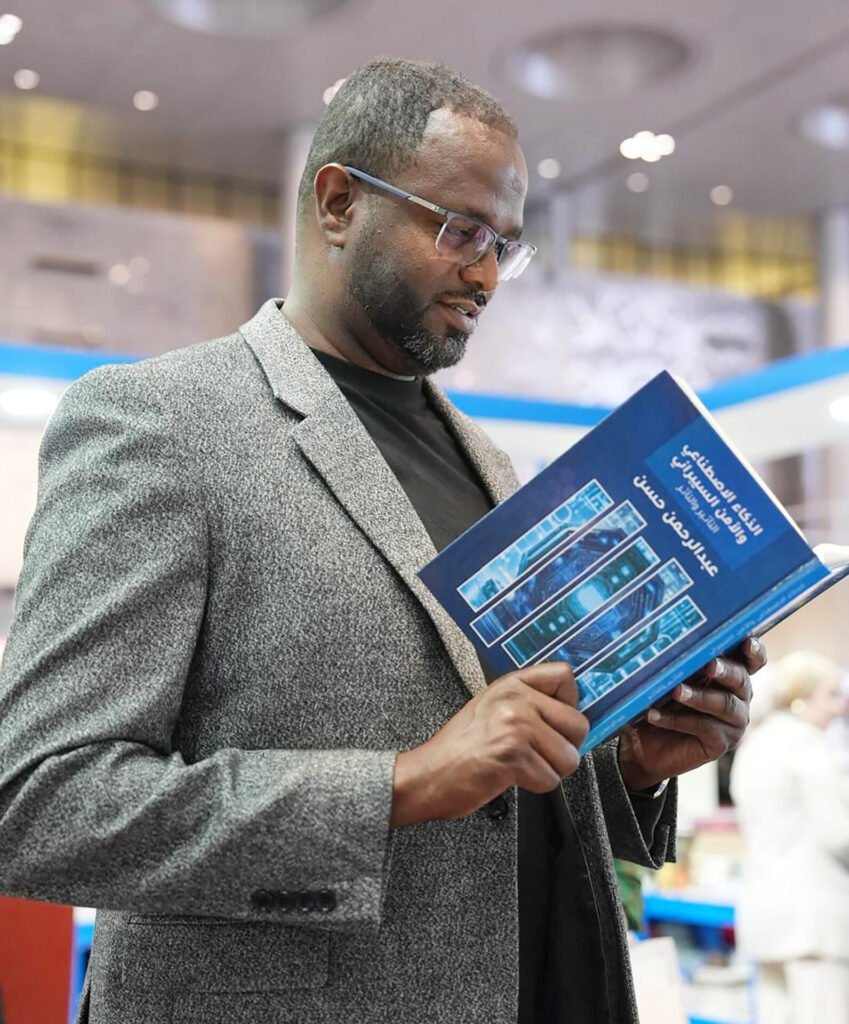Abdulrahman Hassan, a seasoned Information Security and Emerging Technology Expert, proudly announces the official launch of his debut book titled “AI and Cybersecurity – Influence and Impact” during the Doha International Book Fair. The release of this book marks a significant personal and professional milestone, representing years of accumulated experience, research and insight into two of the most transformative fields in today’s digital era.
The story behind this book began when Abdulrahman participated in a prominent cybersecurity conference. As part of the engagement, he was required to submit a research paper examining the relationship between Artificial Intelligence and cybersecurity. During the process of preparing the paper, he realized he was compiling a rich collection of notes, reflections and practical examples from his professional journey. That realization inspired me to embark on the journey of writing this book.

Initially, the writing process followed a technical path, rooted in my two decades of professional experience in the field,” Abdulrahman stated. “However, I received valuable advice along the way that helped shape the final approach. I was encouraged to simplify the content and make it accessible to a broader audience, especially considering that this is my first publication. This shift in direction allowed me to reach not only professionals but also students, decision-makers, and technology enthusiasts who may not have a technical background.
Another key decision was the choice to write the book in Arabic. Abdulrahman discovered a noticeable lack of comprehensive Arabic literature that addressed both Artificial Intelligence and cybersecurity in a unified and structured way. Most existing content either focused on one topic or offered limited references. Recognizing this gap, He felt a responsibility to fill it, and to contribute to the Arabic knowledge base by providing an integrated view of how these two domains are evolving and interacting. By choosing Arabic as the language of publication, he aimed to make the knowledge accessible and valuable to a wider community in the Arab world.
The book is structured into nine chapters. The first few chapters introduce the foundational concepts of AI and cybersecurity and provide an overview of how both fields have evolved over time. These chapters also explore how criminal activity has shifted from traditional methods to sophisticated cyberattacks enabled by modern technology and how AI is revolutionizing cybercrime. Chapters three and four focus on how artificial intelligence and cybersecurity influence one another. I explore how artificial intelligence is being used to enhance cybersecurity defense mechanisms, automate detection systems and predict emerging threats. In later chapters, the book delves into ethical considerations, regulatory challenges and the governance framework of these technologies. The final chapters explore the future of artificial intelligence and cybersecurity, offering forward looking analysis and practical recommendations for individuals, organizations and policymakers.
The release of this book aligns with Abdulrahman Hassan’s long-standing commitment to knowledge-sharing and community development. With over 22 years of experience, Abdulrahman is a recognized expert in the fields of IT and Information Security. As a seasoned expert in Technology and Information Security, he brings a comprehensive blend of expertise in artificial intelligence innovation, cybersecurity and cyber defense strategies, IT service management, governance frameworks, technology risk mitigation, business continuity planning, and strategic IT project delivery.
Throughout his career, he has played a pivotal role in integrating technology and security capabilities to drive innovative, business-aligned strategies. His work has resulted in improved operational efficiency, revenue growth, and enhanced competitive advantage for numerous organizations across Europe and the Gulf region. In addition to his leadership in technical fields, Abdulrahman has served as a local and international IT consultant, bringing his knowledge to diverse audiences and organizations. He is known for his fresh perspectives on innovation and for contributing valuable insights to strategic discussions.
“The book is not just a personal achievement. It is a form of social responsibility,” Abdulrahman added. “I hope this work will benefit the community, raise awareness and encourage others to explore how AI and cybersecurity are shaping the future.”
The launch at the Doha International Book Fair signifies a strong beginning for Abdulrahman’s journey as an author and he hopes to continue writing on impactful topics that empower society and support national and regional digital advancement.
Interview Q and A Section
What is the future of Artificial Intelligence and where do you think it is heading?
AI is already deeply embedded in many aspects of life, from healthcare and education to finance and cybersecurity. In the coming years, we will likely see even more autonomous systems, predictive technologies and decision support tools driven by AI. However, progress must be guided by ethical frameworks, governance standards and a focus on human oversight to ensure AI remains safe and beneficial.
How can ordinary individuals benefit from AI? What are some examples of everyday applications?
AI can enhance everyday life in numerous ways. Examples include smart assistants that help manage schedules, AI-based translation tools, personalized learning platforms, fitness and health monitoring apps and automated financial planning tools. The key is to identify solutions that genuinely add value and improve daily routines.
What are the main risks associated with AI, and how can we manage them?
The risks include data privacy issues, algorithmic bias, misuse in cyberattacks and potential over reliance on automated systems. Managing these risks requires responsible design, regulatory oversight, transparency and continuous risk assessments. A collaborative approach involving governments, industry and academia is essential.
Do you think AI will cause widespread job losses?
AI will certainly change the employment landscape. While some roles may become obsolete, many new jobs will emerge especially in AI development, data analysis, cybersecurity and related fields. The focus should be on preparing the workforce through education, upskilling and adapting to new roles created by the AI economy.
Are we heading toward a future where machines or robots control society?
The idea that machines will dominate humanity is more science fiction than reality; in practice, AI is a powerful tool created and governed by humans. With strong oversight, ethical design, and responsible innovation, we can ensure that AI remains aligned with human values and continues to serve society rather than control it.

















